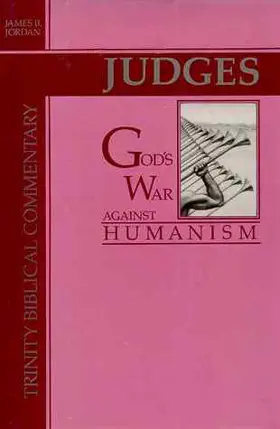

Judges: Gods War Against Humanism
Pages
334 pages
Publisher
Geneva Press
Published
6/1/1985
ISBN-13
9780939404100
Reviews
I have become a collector of commentaries ever since my seminary days in the 1990s. As such, I am only going to recommend the best overall commentary for each book of the Bible on this site. For Judges, for the preacher/teacher, I highly encourage you to invest in Jordan's work on Judges. You might not agree with him on everything, but you will find yourself engaged by his ideas and thoughts. He offers perspective that you will be hard pressed to find in other commentaries on Judges. He does an excellent job, too, of connecting passages from Judges with the full counsel of God's Word. (You might want to supplement Jordan with Dale Ralph Davis, Robert Chisholm, or Daniel Block)
Jordan is a keen observer of the text. He's also magnificent at showing how the larger structure fits together and communicates part of the author's meaning itself. If you don't mind sifting through some strange interpretations for the gems, this is well worth your time.
I found insights in this commentary that I found no where else. As usual James Jordan is ever alert to literary insights and echoes of other Scriptural texts. Some of the correlations he makes with other texts are quite helpful while others seem to be quite imaginative and hard to believe the author really had them in mind (even an inspired author). The same can be said of some of the symbolic meanings he sees in the texts. One of things that he believes is a main theme of the book is the critique against human rule that does not acknowledge God as the true ruler. Humanistic centralized power is not of God and will lead to disaster. This is a good commentary to have to offer other/new perspectives that Block does not talk about. (For example see his section on “minor judges” as being critical to the authors argument about kingship in the way they are structured. Interesting.) Jordan sees much that is good in the judges. He sees them as men of faith. But he is also aware the author is criticizing them as well, especially when their longings for humanistic kingship begin to take the place of the rule of God.
This book is recommended to all who seriously study the book. As I said about Block's commentary, “Use it, but do not use it alone.” And since it can be downloaded free, over the Internet, one need not justify the loss of more money and more book shelf space to obtain it. It can be found at: www.entrewave.com/freebooks/docs/21ee_47e.htm or www.biblicalhorizons.com.

